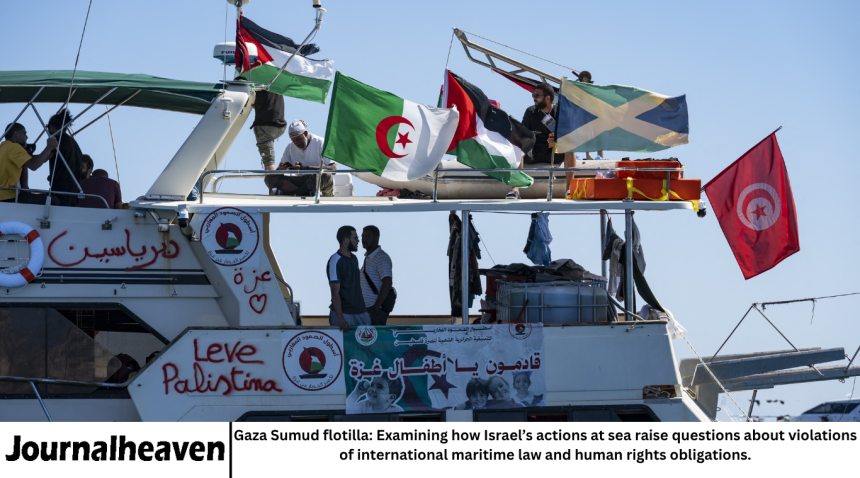The Gaza Sumud flotilla has once again brought global attention to the long-standing debate over Israel’s enforcement of its maritime blockade on Gaza. The latest confrontation between pro-Palestinian activists and Israeli naval forces has revived questions about international law, humanitarian rights, and the limits of state control at sea.
- The Background: What Is the Gaza Sumud Flotilla?
- Israel’s Naval Blockade on Gaza
- The Latest Incident: Intercepting the Gaza Sumud
- What International Maritime Law Says
- Humanitarian and Political Implications
- Global Response and International Reactions
- The Broader Debate: Security vs. Human Rights
- The Symbolism of the Flotilla Movement
- Calls for Accountability and Reform
- The Future of the Gaza Flotillas
- Frequently Asked Questions
- Conclusion
While Israel claims its actions are necessary for security, human rights groups and international observers argue that intercepting civilian vessels in international waters may breach international maritime law. The flotilla’s story is not just about boats and borders — it is about human rights, freedom of movement, and the global call for accountability.
The Background: What Is the Gaza Sumud Flotilla?
The Gaza Sumud flotilla is a part of an ongoing international effort to challenge the Israeli blockade on Gaza, a territory controlled by Hamas but home to over two million civilians facing severe restrictions on movement, trade, and basic supplies.
The term “Sumud” means “steadfastness” in Arabic — symbolizing Palestinian resilience under occupation and siege. The flotilla consists of small ships carrying humanitarian aid, medical supplies, and activists from various countries. Their goal is to peacefully sail toward Gaza to draw attention to the humanitarian crisis and protest what they see as an unlawful blockade.
Previous flotillas — such as the 2010 Mavi Marmara mission — have ended in violence, arrests, and diplomatic fallout. The Sumud flotilla continues this form of civil disobedience, emphasizing non-violence and international solidarity.
Israel’s Naval Blockade on Gaza
Israel first imposed its naval blockade on Gaza in 2007, following Hamas’s takeover of the territory. The blockade restricts sea access beyond six nautical miles from the coast, though that limit has occasionally been tightened during conflicts.
Israel argues that the blockade is a legitimate measure of self-defense, designed to prevent the smuggling of weapons into Gaza. However, critics — including UN experts and human rights groups — contend that the blockade collectively punishes civilians and constitutes an act of economic warfare.
Under international law, a naval blockade may be permissible during armed conflict, but only if it meets specific conditions — it must be publicly declared, not aim to starve civilians, and not obstruct humanitarian aid. Critics claim Israel fails these conditions.
The Latest Incident: Intercepting the Gaza Sumud
Reports indicate that Israeli naval forces intercepted the Gaza Sumud flotilla in international waters before it could approach Gaza’s maritime zone. The vessels were boarded, and several passengers were detained and taken to Israeli ports for questioning.
Eyewitness accounts suggest that the flotilla was peaceful and carrying only medical supplies. Organizers insist that they were operating in accordance with international maritime law, emphasizing that their mission was humanitarian, not political.
Israel defended the interception, citing national security concerns and claiming that all vessels bound for Gaza must pass through approved inspection points. However, this justification is contested by maritime experts who argue that intercepting civilian vessels in international waters violates the freedom of navigation guaranteed under the United Nations Convention on the Law of the Sea (UNCLOS).
What International Maritime Law Says
Under UNCLOS and the San Remo Manual on International Law Applicable to Armed Conflicts at Sea, countries are permitted to enforce blockades during armed conflict, but such actions must respect humanitarian principles.
For a blockade to be lawful, it must:
-
Be formally declared and notified to all parties.
-
Not prevent access to essential humanitarian aid.
-
Not deliberately target civilians.
-
Allow neutral ships carrying humanitarian goods safe passage under supervision.
The Gaza flotilla activists argue that Israel’s blockade breaches these principles because it effectively traps Gaza’s civilian population and restricts access to essential goods. The interception of the Sumud flotilla outside Israel’s territorial waters further complicates its legality, raising questions about the overreach of state power.
Humanitarian and Political Implications
Beyond the legal debate, the humanitarian consequences of the blockade are profound. Gaza faces chronic shortages of clean water, electricity, and medical supplies. The economy is stifled, unemployment rates are among the highest in the world, and reconstruction efforts after repeated conflicts remain slow.
The flotilla movement aims to highlight these conditions, asserting that international silence contributes to Gaza’s isolation. The symbolism of ships carrying aid across the Mediterranean has become a form of protest — one that calls on the global community to uphold moral and legal responsibility.
Israel, on the other hand, views these flotillas as political provocations rather than genuine humanitarian efforts. Officials argue that such missions are coordinated with anti-Israel groups and used to delegitimize its right to self-defense.
Global Response and International Reactions
Reactions to the latest flotilla interception have been divided. Some Western governments, including the United States, have maintained support for Israel’s right to defend its borders, citing Hamas’s history of launching rockets from Gaza.
Meanwhile, several international organizations — including Amnesty International and the UN Human Rights Office — have condemned the interception as unlawful and demanded the immediate release of detained activists.
European civil society groups that organized or supported the flotilla view the incident as part of a broader pattern of suppressing humanitarian activism. They continue to call for the lifting of the blockade and for Israel to comply with international legal standards.
The Broader Debate: Security vs. Human Rights
The Gaza Sumud flotilla brings into focus one of the most complex debates in international relations — how to balance state security with human rights obligations.
Israel insists its blockade prevents weapons and militants from entering Gaza. However, human rights advocates argue that the blockade has evolved into collective punishment, worsening the humanitarian crisis for ordinary Palestinians.
International law experts point out that even legitimate security measures must be proportionate and cannot indiscriminately harm civilians. The ongoing blockade, now more than 17 years old, is increasingly viewed as excessive in both scope and duration.
The Symbolism of the Flotilla Movement
Each Gaza flotilla, including the Sumud, carries symbolic power. The ships represent resistance against isolation and the demand for justice through peaceful protest. For the activists aboard, risking detention or even violence at sea is a statement that the world must not ignore Gaza’s suffering.
These missions have drawn attention to the plight of Gazans more effectively than many political resolutions. They also serve as a reminder that humanitarian activism, though peaceful, often faces the full force of state power.
Calls for Accountability and Reform
International calls for accountability are growing. Human rights lawyers have urged the International Criminal Court (ICC) to investigate whether Israel’s naval actions constitute violations of international law.
The United Nations has also recommended that states ensure freedom of navigation and support humanitarian initiatives aimed at Gaza. However, geopolitical divisions often prevent any binding action, leaving activists and civilians caught in a legal and political stalemate.
The Future of the Gaza Flotillas
Despite repeated interceptions, the flotilla movement shows no sign of slowing down. Organizers of the Gaza Sumud have announced plans for future missions, vowing to continue their efforts until the blockade is lifted.
Their persistence reflects both the desperation of Gaza’s humanitarian situation and the belief that civil society must act when governments fail to do so. For them, the sea remains one of the last frontiers of nonviolent resistance.
Frequently Asked Questions
What is the Gaza Sumud flotilla?
The Gaza Sumud flotilla is an international humanitarian effort aimed at challenging Israel’s blockade on Gaza by sailing aid-filled ships toward the territory.
Why does Israel intercept Gaza-bound ships?
Israel argues that the blockade prevents weapons from reaching Hamas and other militant groups, claiming it is a necessary measure for national security.
Is Israel’s blockade on Gaza legal under international law?
Many international experts say it violates maritime and humanitarian law because it restricts civilian goods and movement, amounting to collective punishment.
What does “Sumud” mean?
“Sumud” is an Arabic word meaning “steadfastness” or “resilience,” symbolizing the Palestinian struggle to endure and resist under occupation.
Where did the flotilla interception take place?
Reports indicate the interception occurred in international waters, raising concerns about violations of the freedom of navigation guaranteed by international law.
How has the international community responded?
Reactions are mixed. Some Western nations support Israel’s actions, while human rights organizations and several governments have condemned the interceptions.
What is the purpose of future flotillas?
Activists plan to continue organizing flotillas to raise global awareness, deliver humanitarian aid, and pressure Israel to lift the Gaza blockade.
Conclusion
The Gaza Sumud flotilla is more than just a protest voyage; it’s a reflection of a world divided between security narratives and human rights principles. Israel’s enforcement of its blockade — and its interception of humanitarian ships — continues to challenge the boundaries of international maritime law.
As the global community watches, the core question remains: how long can humanitarian action be criminalized under the guise of security? The flotilla’s mission may be symbolic, but its message is clear — the principles of international law and human dignity must not be abandoned at sea.








